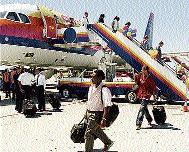
Passengers disembarking an Air Jamaica flight. - File
The International Monetary Fund (IMF) has again recommended that the Government shut down Air Jamaica and consider closing the sugar industry in favour of tourism-drive agriculture, as part of efforts to ease the strain on the national budget from loss-making state enterprises.
Air Jamaica transports about half of all passengers to Jamaica, and over a third of the tourism traffic, but the airline has consistently lost money, with an accumulated deficit over the past decade of about US$1 billion.
Last year, for instance, the carrier lost US$136 million, up from US$113 million the previous year, despite a restructuring plan aimed a boosting revenues and cutting costs.
"These losses add to the government debt burden as they are financed through a combination of government transfers (the administration announced an annual cap of US$30 million in support for the airline) and commercial loans contracted under government guarantee," the Fund said, noting in a recent port that this flow of red ink was unsustainable.
As they have done in previous analyses of the Jamaican economy, going back to the late 1990s, the IMF would like radical action, like shutting down the airline and allowing its routes to be taken up by privately-owned airlines.
But when IMF staffers posited that idea during their most recent review of the Jamaican economy, they received the standard answer: that the airline was strategic to the Jamaica's critical tourist industry.
Jamaican officials also told the IMF analysts that airlines, internationally, and not only Air Jamaica, were currently losing.
"Notwithstanding the recent increase in service to Jamaica by other airlines, they (the Jamaican authorities) saw tangible as well as intangible benefits to a tourism-dependent economy to maintaining its own flag carrier, especially since Air Jamaica was the only direct service provider on a number of important routes," the IMF reported.
Some of the losses of the past year were due to one-off costs, such as fleet rehabilitation, and would be lower in the future.
However, the IMF's argument is that the principle of structural reform should, in the first principle, be "to ensure commercial viability" and that if the current reforms failed to turn around the carrier the government "may need to reconsider the merits of maintaining a flag carrier."
They conceded, however, that the situation with the sugar industry, which employs nearly 40,000 people, was more difficult.
Jamaica is faced with losing preferential markets for sugar in Europe, where EU states, under pressure at the World Trade Organisation, are cutting to the price they pay to domestic producers, to which imports from countries like Jamaica are indexed.
The Government - whose Sugar Company of Jamaica has lost nearly J$6 billion over the past two fiscal years and projects to lose another three-quarter billion this fiscal year Ñ hopes to transform the industry into one that produces some sugar, rum as well as ethanol for export and as an additive for gasoline. The government has put up its estates, which produces sugar at an average cost of US$28 cents per pound, for sale. That production compares to the the average US$19 cents per pound by private producers, which is itself substantially higher than international competitors.
The Government has estimated that it would cost up 556 million euro to overhaul and re-orient the sugar industry in line with the current strategic thinking, but the IMF pointed out that the "sources of financing have not been clearly identified."
The IMF is clearly doubtful that the reform is doable in the context of Jamaica's pricing structure.
Said the report: "Fundamentally ... given the current cost-price structure, it is difficult to see Jamaica becoming globally competitive in sugarcane farming, suggesting that diversifying from sugar into other case-based products (rum, ethanol, power-co-generation) may not be cost effective.
"There appeared, on the other hand, significant potential for rural areas to help supply the rapidly expanding hotel sector with local produce. This suggested that the priority should be on helping sugarcane farmers make the transition to other activities, while also ensuring that a social safety net continues to exist.'
business@gleanerjm.com

